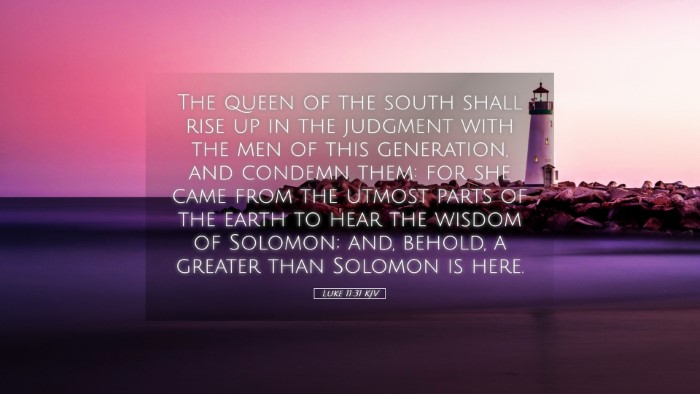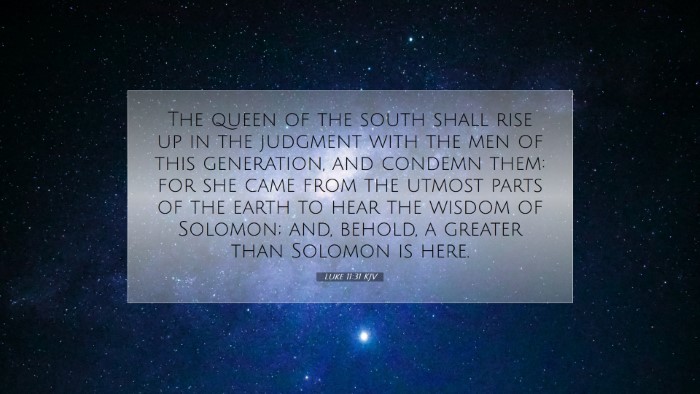Commentary on Luke 11:31
“The Queen of the South will rise up at the judgment with the men of this generation and condemn them, for she came from the ends of the earth to hear the wisdom of Solomon, and behold, something greater than Solomon is here.” (Luke 11:31, ESV)
Introduction
This verse is nestled within a broader discourse in which Jesus addresses the unbelief of the current generation. The reference to the Queen of Sheba serves as a poignant reminder of those who sought wisdom and truth, contrasting their actions with the attitudes of the contemporaries of Christ.
Contextual Analysis
Matthew Henry's Commentary emphasizes the significance of the Queen of Sheba's journey to Solomon, noting that her quest for wisdom and understanding of God was genuine. She traveled a great distance to hear the wisdom that God had granted Solomon. In contrast, Henry points out that the people in Jesus' time lacked such earnestness.
Albert Barnes further elaborates that the mention of the Queen not only highlights her commendable pursuit but also frames the accountability of the Jewish people, who had God's presence among them and yet remained unresponsive. Barnes notes that the greater than Solomon refers to Christ Himself, embodying divine wisdom and authority.
Theological Implications
The phrase “something greater than Solomon is here” serves as both a declaration of Jesus’ authority and an admonition of the people’s spiritual blindness. Adam Clarke reflects on the theological significance of Jesus being the embodiment of wisdom incarnate, illustrating that to reject Him is to reject the highest revelation of God’s wisdom.
Wisdom of Solomon vs. Greater Wisdom
Clarke notes that while Solomon was a king renowned for his wisdom and understanding, Christ surpasses Solomon in every regard—both in His message and His divinity. This presents a clear challenge to those who dismiss Him, pointing to the futility of their unbelief. The narrative invites all, especially the leaders and scholars, to recognize the supreme authority of Christ.
Condemnation Through Comparison
The stark contrast between the Queen’s pursuit and the contemporaneous attitudes highlights a critical theme: the judgment that will be rendered in the end times. Henry asserts that it serves as a warning to the religious and pious of the day who fail to recognize and respond to divine revelation.
Practical Applications
- Desire for Wisdom: Believers are encouraged to emulate the Queen’s thirst for wisdom, reminding themselves that seeking knowledge of God is a noble and necessary pursuit.
- Awareness of Accountability: This passage teaches that with privilege comes responsibility. Those who hear the gospel are accountable to respond to it, as displayed by the refusal of Jesus' contemporaries.
- Recognizing Christ's Authority: Acknowledging the supremacy of Christ’s wisdom should drive believers to deeper faith and trust in His teachings, leading to transformation in their lives.
Conclusion
Luke 11:31 stands as a striking reminder of the call for recognition of Christ’s authority and wisdom. The dialogue concerning the Queen of Sheba and Jesus invites reflection on our own pursuit of wisdom and our response to God's revelation through Christ. As believers and scholars, we are summoned to not only admire the wisdom of the past but to embrace the greater wisdom represented in the person of Jesus, recognizing that our response to Him echoes throughout eternity.
This commentary combines perspectives from Matthew Henry, Albert Barnes, and Adam Clarke, providing a well-rounded understanding suitable for pastors, students, theologians, and Bible scholars alike.


